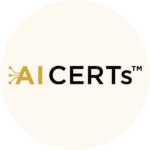
AI CERTS
3 weeks ago
AI Could Soon Tackle Projects That Take Humans Weeks: A New Era of Productivity Is Emerging
In a monumental leap toward transforming how work is done, artificial intelligence (AI) is nearing the capability to complete tasks that traditionally take human teams weeks—or even months—in just hours. From drafting business strategies and analyzing large datasets to generating high-quality content or writing code, AI’s evolution is reshaping the foundation of workplace productivity across industries. This rapid advancement could usher in one of the most significant technological disruptions of the 21st century.
Recent developments in generative AI models like OpenAI’s GPT-4, Google’s Gemini, and Anthropic’s Claude have highlighted the capacity for machines not only to assist humans but to manage, optimize, and even autonomously execute complex projects. The integration of reasoning, real-time web access, memory, multi-modal inputs (text, image, audio), and agentic behavior—where AI can plan, self-correct, and complete multi-step goals—has made once-unthinkable feats entirely possible.

The Power Behind the Speed: How AI Is Changing the Game
Unlike traditional tools that automate specific repetitive tasks, the new generation of AI is context-aware, capable of strategic thinking, and functions across various domains simultaneously. For instance, a startup pitch deck, which might take a marketing team two weeks to craft, can now be produced by AI in a few hours—complete with market analysis, brand visuals, competitive benchmarking, and funding insights.
Similarly, in software development, AI coding agents such as GitHub Copilot or OpenAI's Codex can write, debug, and refactor code in record time. They can execute what normally requires multiple sprints of development into a single continuous workflow, reducing costs and accelerating time-to-market. In academia, AI tools are being used to summarize large volumes of research, identify trends, and even generate draft research papers with references, something that used to take months.
Emerging Applications Across Industries
- Healthcare: AI systems are aiding in diagnostics, drug discovery, and medical imaging analysis. What used to be a 3-week radiology report turnaround can now be accomplished in minutes.
- Legal: AI tools review legal contracts, draft arguments, and scan through court rulings to provide actionable legal intelligence in a fraction of traditional timelines.
- Marketing: Campaign strategies, SEO content creation, video scripts, and even social media calendars can now be created in bulk through platforms like Jasper AI and Copy.ai.
- Finance: Investment analysis, risk modeling, and fraud detection that would otherwise require weeks of data crunching are now handled within hours by advanced AI algorithms.
- Engineering & Architecture: Generative design tools now assist in creating blueprints, simulations, and environmental modeling far quicker than any human-led design team.
Benefits and Concerns: Two Sides of the Coin
The benefits of this evolution are profound. Companies can reduce overhead costs, increase output, and innovate faster. Startups can scale with fewer employees, while enterprises can redirect human focus toward high-level problem-solving and strategy.
However, this speed and automation come with their share of ethical, economic, and employment concerns. There is growing unease about job displacement, skill redundancy, and the widening gap between those with access to AI tools and those without. Governments and organizations are being urged to create frameworks for responsible AI deployment, ensuring transparency, fairness, and inclusive growth.
The Road Ahead: What’s Next for Human-AI Collaboration
Experts believe that the future won’t just be about AI replacing jobs but augmenting them. Imagine a team where AI handles 80% of the operational load, and human employees focus on creativity, empathy, decision-making, and leadership. The shift is not about removing humans from the loop but redefining their role in it.
Tech leaders, including Sam Altman (OpenAI), Sundar Pichai (Google), and Elon Musk (xAI), have echoed the sentiment that the goal is to build AI systems that act as collaborators. The rise of AI agents—tools capable of independently completing multi-step tasks—is being compared to the birth of the internet or smartphones: a utility that redefines the world.
Conclusion: The Future Is Now, and It’s Exponentially Faster
As AI continues to evolve, the question is no longer if machines will handle complex, time-intensive projects—it’s how soon and how we adapt. This technological acceleration could empower humanity to solve problems faster than ever before, from climate modeling to education reform. But it also calls for a rethinking of work, policy, and ethics to ensure this power is used responsibly.
One thing is clear: the race toward ultra-fast productivity has already begun, and artificial intelligence is leading the charge.
Source-